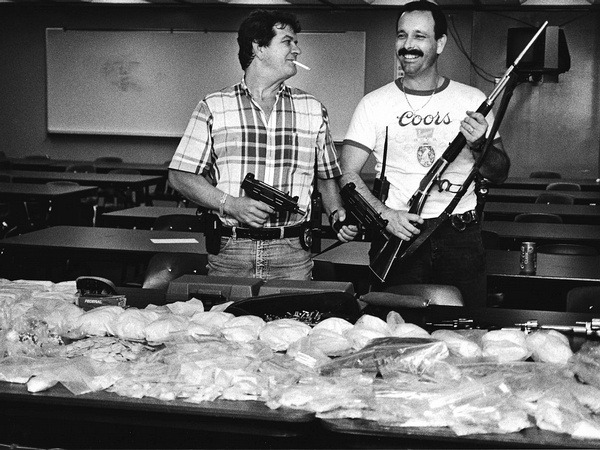Narrator: The war is brutal, in the three years following Calderon's election another 15,000 people are gunned down.
旁白:戰(zhàn)爭(zhēng)是殘酷的,在卡爾·德隆上臺(tái)后的三年里,另有15000人被槍殺。
But the deaths don't deter people from entering the business.
但死亡并不能阻止人們進(jìn)入這個(gè)產(chǎn)業(yè)。
Hundreds of poor Mexicans are eager to step into Eddie's shoes and take over his trafficking routes by undermining his position.
成百上千的貧困墨西哥人都渴望步埃迪的后塵,并通過(guò)破壞他的位置來(lái)接手他的販毒路線。
As an American working in Mexico, he's under constant suspicion.
作為一個(gè)在墨西哥工作的美國(guó)人,他不斷地受到質(zhì)疑。
Eddie: I was the only white guy at my level and every time something happened everybody would look at me first.
埃迪:達(dá)到這個(gè)水平的只有我一個(gè)白人,每次有事情發(fā)生,大家都會(huì)先看看我。

Narrator: Eddie's partner and friend, accuses him of being an informant, and demands a meeting in Tijuana.
旁白:埃迪的同伙和朋友,指控他是線人,并要求在蒂華納會(huì)面。
Eddie: I wasn't that stupid, I brought my crew with me, so, he had his crew, you know, armed crew and I had mine too and he didn't want a big blood bath so we just left it at that.
埃迪:我才不那么愚蠢呢,我?guī)Я宋业氖窒拢瑯樱兴氖窒拢牛蔽溲b的手下,我的也是,他也不想來(lái)一場(chǎng)大血拼,所以我們就安然無(wú)恙的離開(kāi)了。
Narrator: Eddie realizes it's time to leave Mexico; he leaves behind everything he owns and escapes to the US.
旁白:埃迪意識(shí)到是離開(kāi)墨西哥的時(shí)候了;他拋下了自己的一切,逃去美國(guó)。
Eddie: I'm one of the lucky guys that got out.
埃迪:我是一個(gè)幸運(yùn)的家伙,能夠跑出來(lái)。
There's not, there's a lot of guys, there's a whole cemetery, not even a cemetery, there's a whole, you know, fields in Mexico, you know, just full of dead bodies, unidentified bodies that didn't make it out.
那不是,有很多的家伙,那整個(gè)是一座墓地,甚至算不上墓地,那是一整個(gè),嗯,墨西哥的田野里,到處是死尸。身份不明的死尸,無(wú)法辨認(rèn)。
Narrator: Despite the on-going violence in Mexico, 51 billion dollars worth of cocaine still floods across the border into the US every year.
旁白:盡管墨西哥的暴力活動(dòng)還在持續(xù),每年,價(jià)值510億美元的可卡因依然如洪水般越過(guò)邊境進(jìn)入美國(guó)。
Narrator: The Mexican cartels purchase their cocaine from Colombia where over half of the world's cocaine is produced.
旁白:墨西哥的卡特爾組織從哥倫比亞購(gòu)買可卡因,后者的可卡因產(chǎn)量占全世界一半。
While the cartels earn millions of dollars smuggling cocaine; the peasant farmers who grow the coca plants are lucky to earn enough to survive.
當(dāng)卡特爾組織通過(guò)走私可卡因賺得數(shù)百萬(wàn)美元時(shí),種植古柯植物的農(nóng)民也幸運(yùn)地賺到足夠錢來(lái)生存。
28 year-old Andres Varela is one of the tens of thousands of farmers who grow the Coca that will become cocaine.
28歲的安德烈斯·瓦雷拉就是這樣千百萬(wàn)農(nóng)民中的一員,他們種植用來(lái)制作可卡因的古柯。
...... Andres Varela: In the good times, yes it gave me good monthly return. You could get a profit of a million pesos ($500) , it depended on the harvests. That was enough for you to pay for clothes, for food, to be able to sustain yourself......
安德烈斯·瓦雷拉:運(yùn)氣好的時(shí)候,每月都會(huì)給我?guī)?lái)豐厚的回報(bào)。你可以得到一百萬(wàn)比索(500美元)的利潤(rùn),這取決于收成。它足以維持你穿衣吃飯,養(yǎng)活自己......
Narrator: Andres prefers to grow food crops, but he knows cocaine paste is where the money is.
旁白:安德烈斯更愿意種植糧食作物,但他知道可卡因膏就是錢。
...... Andres Varela: My father and mother cultivate corn, yucca plants, and other crops, and they couldn't afford to send me to school......
安德烈斯·瓦雷拉:我的爸爸和媽媽種玉米、絲蘭植物和其他作物,但他們不能供不起我上學(xué)。
Narrator: Colombian farmers sell yucca plants for 40 cents a kilo, but cocaine paste sells for $750 per kilo.
旁白:哥倫比亞農(nóng)民賣絲蘭植物,一公斤40美分,但可卡因膏的售價(jià)是每公斤750美元。
More importantly, there's constant global demand for cocaine, unlike corn or yucca. But growing coca isn't without risk.
更重要的是,跟玉米和絲蘭花不同,可卡因的全球需求不斷。但種植古柯也不是沒(méi)有風(fēng)險(xiǎn)。



